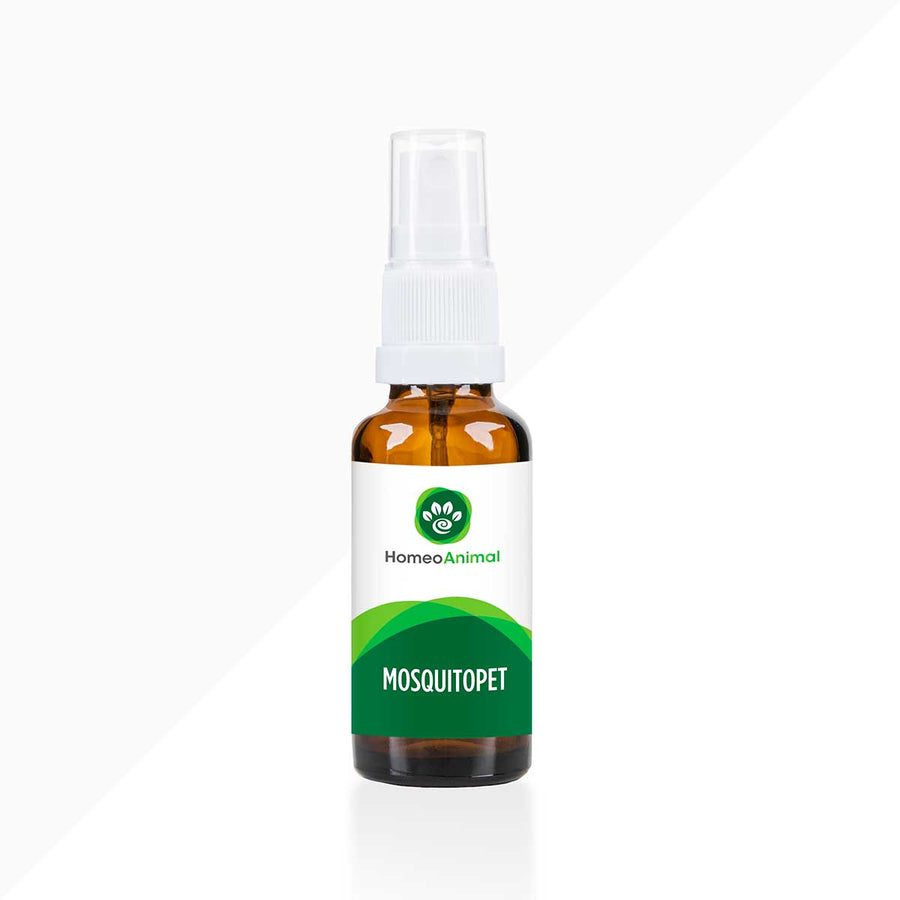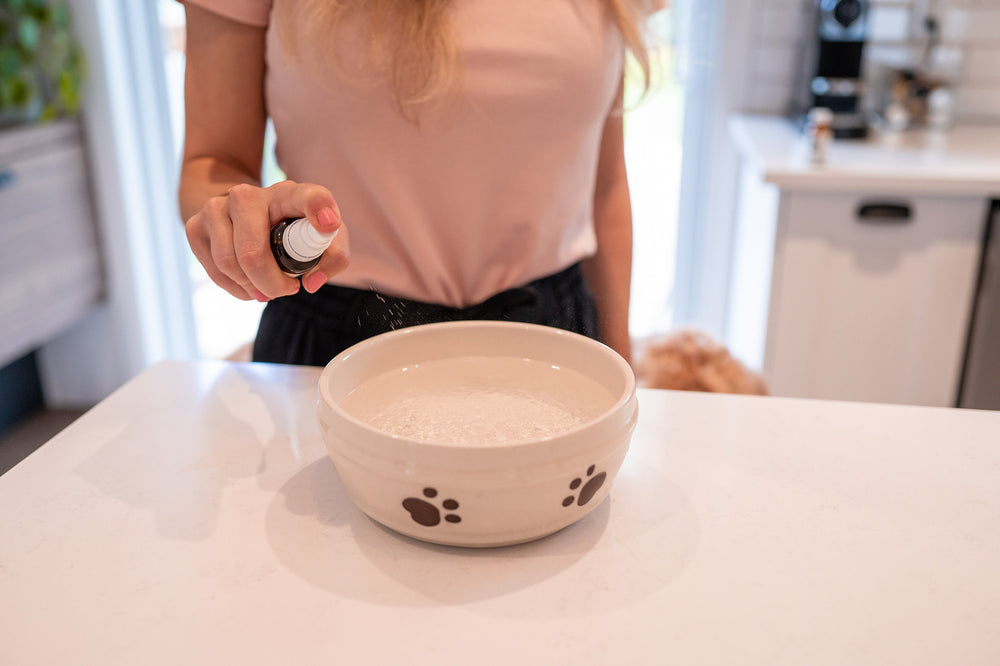Vet Insights: Top 2 Natural Mosquito Repellents for Dogs
List of Contents
Mosquitoes aren’t just a nuisance for your dog—they can also pose serious health risks. In addition to causing itching and irritation, these pests can trigger allergic reactions and spread dangerous diseases like heartworm, West Nile virus, malaria, and dengue.
Mosquitoes can be persistent, but with the right, safe strategy, you can relax indoors and outdoors without worrying about bites.
In this article, we’ll explore how to create an effective homemade mosquito repellent using simple ingredients. We’ll also share additional tips to help keep you and your dog safe from mosquitoes.
Why Are Mosquitoes a Serious Threat to Dogs?

As mentioned, mosquitoes pose a significant risk to dogs, primarily because they can transmit heartworm, West Nile virus, and other serious diseases. Even more concerning, illnesses like malaria and dengue can also affect you and your family, including your dog.
The most effective approach is to keep mosquitoes away, as some treatments for mosquito-borne diseases come with risks and complications. Keep in mind that some of these illnesses can be life-threatening.
Why Use Natural Mosquito Repellents for Dogs?
Here's the thing: remember that human mosquito repellents like Picaridin and DEET are not safe for dogs. These chemicals can lead to toxicity, skin irritation, breathing difficulties, and other health concerns.
Take DEET, for example. Once absorbed into your dog’s bloodstream, it can harm the nervous system, causing issues ranging from skin irritation to breathing difficulties. In severe cases, it can even lead to poisoning.
That’s why opting for safer, natural alternatives is key to protecting your dog from mosquitoes without compromising health. However, it’s important to note that repellents containing clove, pennyroyal, and wintergreen can also cause adverse effects, so they should be avoided.
2 Best Natural Mosquito Repellents to Protect Your Dog

Interestingly, you can create safe and effective mosquito repellents for your dog at home using simple ingredients from your kitchen or pantry. The next time these pesky insects appear, try the following recommendations:
#1. Apple cider vinegar can be used to make an anti-mosquito spray.
The strong aroma of apple cider vinegar (ACV) serves as a natural insect repellent, keeping mosquitoes away. To prepare a spray, mix equal parts ACV and water in a spray bottle. Let it rest for 10 minutes, then shake well before using. However, the effectiveness of ACV as a mosquito repellent may be limited.
Be sure to spray at close range and avoid contact with your dog’s eyes, ears, nose, or any open cuts or wounds.
Alternatively, combine a teaspoon of honey or dish soap with two tablespoons of ACV and pour the mixture into a saucer. This will act as a trap for flies and mosquitoes.
#2. Using citrus peels in water is an eco-friendly way to deter mosquitoes.
Did you know that orange, pomelo, lime, and lemon peels contain natural repellent compounds like citronellal and limonene? However, it is important to note that these compounds are toxic to dogs if ingested.
Research suggests that when combined with substances like neem oil, these compounds can be nearly as effective as DEET in repelling mosquitoes.
Steep the peels in water for at least three hours to extract their beneficial compounds. Then, transfer the infused liquid to a spray bottle and apply it carefully around the house, ensuring your pet cannot lick the sprayed areas.
Keep in mind that the mixture may stain furniture and fabrics. Alternatively, spray it on the window and door frames to help prevent mosquitoes from entering your home.
Where Do Mosquitoes Breed Indoors and Outdoors?
Did you know your home and backyard could be the perfect breeding ground for mosquitoes without realizing it? Identifying these areas is crucial for keeping mosquitoes at bay. Here are some common culprits:
- Stagnant or standing water
- Pools and ponds (even small puddles count!)
- Clogged gutters and ditches
- Open or improperly sealed septic tanks
- Empty containers that collect water, such as birdbaths, tires, and flowerpots
- Certain plants that trap water, like bromeliads, bamboo, and elephant ears (Colocasia and Alocasia)
In addition to mosquitoes, these areas can also become breeding grounds for insects like fleas and ticks, which may carry diseases similar to those spread by mosquitoes.
Extra Tips for Protecting Dogs from Mosquitoes

You don’t need costly anti-mosquito gear to keep these pests at bay. By taking a few simple and effective steps, you can create a mosquito-free environment. Here are some key tips to help you get started:
Make sure to regularly empty and refresh your dog’s water bowl.
Surprisingly, your pet’s water bowl can become a breeding ground for mosquitoes if not emptied regularly, much like other sources of standing water around your home. To prevent this, frequently refresh the water while ensuring your dog stays hydrated for optimal health.
Zumalka’s SILVERPET is specially made to help relieve skin irritation and itchiness.
SILVERPET is formulated with colloidal silver, a substance scientifically proven to have antimicrobial and antifungal properties.
In addition to being a natural remedy for itching and irritation caused by mosquito bites, this premium product can also be used as a preventive measure or alongside medical treatment. Its gentle yet effective formula makes it a safe choice for regular use, providing ongoing protection and relief.
Consider using a mosquito net for extra protection against bites.
If your dog enjoys spending time outdoors, it’s important to provide extra protection against mosquitoes, as well as other biting insects and parasites. Placing a mosquito net over their resting area is an easy and effective solution—and there's no need to invest in an expensive one to get the job done.
Plan your daily walks strategically.
Avoid walking your dog during peak mosquito activity, typically at dawn and dusk when these pests are most active. Mosquitoes are attracted to body heat and movement, making your pet an easy target during these times. Instead, opt for walks in the late morning or early evening when mosquito activity is lower.
Make use of mosquito-repelling plants to help keep these pests away.
Interestingly, certain plants naturally repel mosquitoes, including basil, rosemary, catnip, marigolds, lemon balm, and lavender. You can grow them in your yard or keep potted versions indoors to help keep these pests away. A quick note: Be sure your dog does not eat these plants, as some may cause irritation or gastrointestinal upset.
FAQs
What is the best homemade mosquito repellent for dogs?
A homemade mosquito repellent for dogs combines apple cider vinegar or citrus peel-infused water. Always dilute properly and avoid essential oils toxic to dogs, such as tea tree, citrus, and peppermint. Be sure to spray the mixture only on furniture, windows, door frames, and fabrics—never directly on your dog, as citrus is toxic to pets.
Is apple cider vinegar an effective mosquito repellent for dogs?
Apple cider vinegar may help repel mosquitoes on dogs due to its strong scent and acidity. Mix it with water in a spray bottle and apply lightly, but keep in mind it's not as potent as commercial repellents.
What smell do mosquitoes hate the most?
Mosquitoes hate scents like citronella, lavender, eucalyptus, peppermint, and lemon balm. These natural repellents mask the carbon dioxide and body odors that attract mosquitoes, helping to keep them away from you and your pets. Many of these plants are toxic to pets, so ensure they are not ingested. Additionally, essential oils are even more toxic.
Does coconut oil repel mosquitoes on dogs?
Coconut oil has mild mosquito-repelling properties due to its lauric acid content. While it can offer some protection, it’s not as effective as dedicated repellents. Applying it can also help soothe your dog’s skin and deter other pests.
Can I spray coconut oil on my dog?
Yes, you can spray diluted liquid coconut oil on your dog’s coat to help moisturize the skin and deter pests. However, use it in moderation to avoid greasiness, and ensure your dog isn’t allergic before applying.
What is the most effective homemade mosquito repellent?
A natural homemade mosquito repellent combines apple cider vinegar, water, and citrus peels. Always dilute properly and avoid essential oils, as they can harm pets like cats and dogs. Be sure to spray the mixture only on furniture, windows, door frames, and fabrics—never directly on your dog—to prevent potential health issues.
Will spraying vinegar keep mosquitoes away?
Spraying vinegar, especially apple cider or white vinegar, may help repel mosquitoes due to its strong scent. Be sure to spray the mixture only on furniture, windows, door frames, and fabrics—never directly on your dog—to prevent potential health issues. However, its effectiveness is limited and may not work as quickly as commercial mosquito repellents.
Does Vicks repel mosquitoes?
Vicks is not safe for dogs because it contains menthol and eucalyptus oil. While it may have scents that mosquitoes dislike and provide some repellent effects, it is not a reliable solution.
Is Vicks safe for dogs to inhale at night?
Vicks contains menthol, camphor, and eucalyptus oil, which can harm dogs if inhaled excessively. To keep your pet safe, ensure proper ventilation and keep Vicks out of their reach. If you need to use this, do so with extreme caution.
How can I naturally repel mosquitoes?
To naturally repel mosquitoes, grow mosquito-repelling herbs, remove standing water, and use diluted vinegar or citrus peels as a spraying agent. Be sure to spray the mixture only on furniture, windows, door frames, and fabrics—never directly on your dog, as citrus is toxic to pets. Wearing light-colored clothing and using fans can also help keep these pests away.
Conclusion
Mosquitoes aren’t just a nuisance—they can also pose health risks to your dog by causing discomfort and transmitting diseases. While commercial repellents are available, natural alternatives offer an effective and gentle way to keep your pet protected.
Before using natural mosquito repellents or making changes that may affect your pet’s health, it’s important to consult your veterinarian or a pet homeopathy expert to ensure the best and safest approach for your pet.









Leave a comment